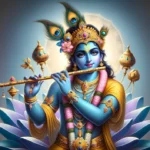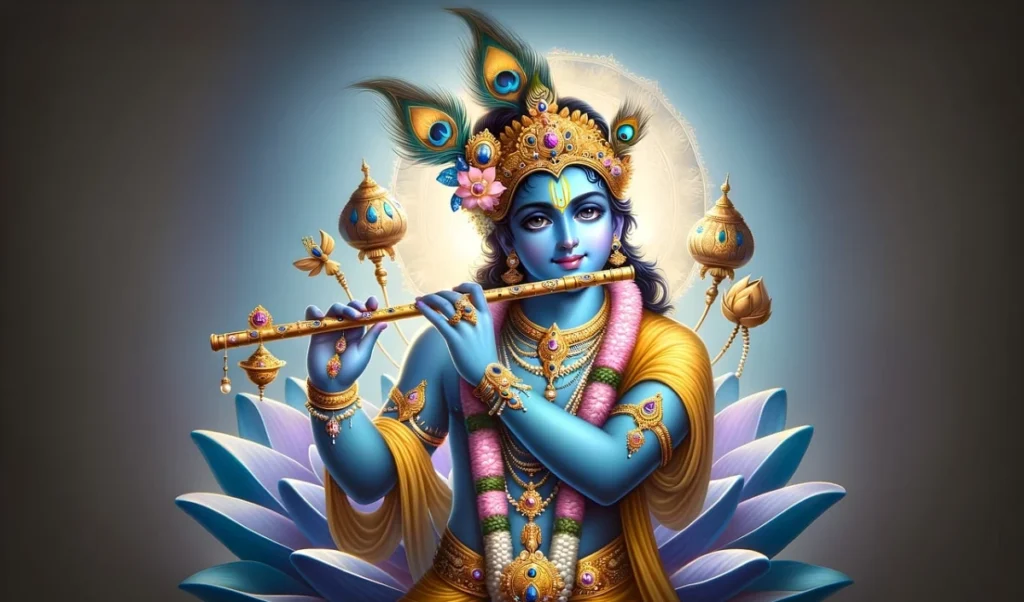
Krishna Janmashtami (कृष्णजन्माष्टमी, IAST: Kṛṣṇajanmāṣṭamī)
is an annual Hindu festival that celebrates the birth of Krishna, the eighth avatar of Vishnu.
In certain Hindu texts, such as the Gita Govinda, Krishna has been identified as supreme God and the source of all avatars. Krishna's birth is celebrated on the eighth day (Ashtami) of the dark fortnight (Krishna Paksha).

Krishna and Rama are the two great avataras or incarnations of Hinduism. They are both said to be the incarnations of Lord Vishnu.
Avatara means “descent,” and this descent is a direct manifestation in humanity by the Divine to aid the human soul in its ascent to the divine status. It is a manifestation from above of that which we have to develop from below. The avatara comes to give the outer religion of humanity an inner meaning, which will enable it to grow into divine status. The ordinary person has to evolve and ascend into the god-head, but the avatara is a direct descent into human form. The first is a birth from ignorance into ignorance under the shroud of maya, or the cosmic veil of illusion, and the other is a birth from knowledge into knowledge, with all powers intact and a full awareness and consciousness of his supreme status. He is thus a dual phenomenon, for he appears human and is yet divine. This has to be, for the object of the avatara is to show that human birth with all its limitations can still be the means for a divine unfolding. If the avatara were to act in a super-human way all the time, this purpose would be nullified. He might even assume human sorrow and suffering, like Sri Rama, in order to show that suffering itself may be the cause of redemption. Krishna however is unique because even in the hours of deepest sorrow and travail, he showed himself to be a complete master of the situation, thus exemplifying the truth of how one who is established in unity with the Divine can remain unaffected in the midst of pain and sorrow. Hence, this avatara in the form of Krishna is known as purnavatara, or the complete descent of the entire divinity into the form of humanity.
He was born at midnight on the 8th day (ashtami) of the dark phase of the lunar month of Bhadra, under the star known as Rohini about five thousand years ago. The traditions of the Hindu faith are kept alive for thousands of years. Even today his birthday is celebrated all over India on this very day.
Krishna was born on the 8th lunar night, at midnight in a dungeon belonging to Kamsa, the king of the Yadavas, in the city of Mathura. He was the eighth son of his parents, Devaki and Vasudeva, who were scions of the Yadava clan. The number eight holds great significance in his life as well as for all his devotees.
Kamsa, a wicked king, had been warned that he would meet his end at the hands of the eighth child of Devaki and Vasudeva. Consequently, he imprisoned the parents. However, when the baby was born, Vasudeva received divine guidance to take him to the cow-herd settlement called Gokula. Miraculously, the dungeon doors opened on their own, allowing Vasudeva to transfer the baby to the house of Nanda, the chief of the cow-herds, whose wife Yashoda had just delivered a baby girl. The babies were exchanged, and Vasudeva brought back the girl-child to the dungeon in the same miraculous fashion.
Krishna grew up in Gokula and later in Vrindavana until the age of twelve. Kamsa sent many people to kill him, but he defeated them. At the age of twelve, he went to Mathura, where he killed his uncle Kamsa, thus freeing the Yadavas from the tyrant's rule. He became a heroic and invincible figure, gradually assuming leadership of the Yadava and Vrishni clans, even though he did not accept the title of king. He defeated many tyrant kings, making the Yadavas one of the most powerful forces of his time. He established his new capital on the island of Dwaraka, on the western seacoast of India, then known as Bharatavarsha, and played a pivotal role in shaping the cultural and political life of his era. Though he did not take up arms, he played a decisive part in the great Mahabharata war.
No other single person has influenced the course of India’s religion, philosophy, art and literature as Krishna. The Sanskrit word “krishna” has two meanings. Krishna means dark. It also has another root and that is “karsha” which means to entice or enchant. Both these meanings are true of the great incarnation known as Krishna. He was dark in colour and had the capacity to enchant everyone. The story of his life has thrilled the hearts of all those who have been fortunate enough to have heard it. That is why despite the fact that he existed more than five thousand years ago, the tale is still as delightful and exciting as it was during his own life time. In fact you find that his devotees are increasing all over the world.
As a man, he was a Mahayogi, the greatest of all yogis, totally unattached, having complete mastery over himself and nature, capable of controlling the very elements, if need be. His miracles were only an outflow of his perfect unity with God and, therefore, with nature. The spiritual gospel that he taught is known as the Bhagavata Dharma and is chiefly expounded in the Bhagavad Purana, Bhagavad Gita and the Uddhava Gita. The simplicity of his teachings were such that it could be followed by any man, woman, or child, unlike the Vedic teachings, which were meant only for the elite.
His most famous teaching is contained in the Bhagavad Gita which was the advice he gave to his friend and cousin, Arjuna at the commencement of the great battle known as the Mahabharata war. Arjuna begs Krishna to help him out of his dilemma. His problem was a particular one related to his special need. Krishna’s answer is the whole of the Bhagavad Gita and cuts at the root of the human problem which is one of ignorance. Ignorance of the nature of our own selves, ignorance of the nature of the Supreme Being and ignorance of the nature of the universe that we inhabit. He teaches Arjuna the technique of action, known as Karma Yoga which is so important to us to practice in our daily lives. This is why the Bhagavad Gita is still as fresh and applicable to modern life as it was when it was first given to Arjuna five thousand years ago.
The charm of his avatara is the perfection with which he played every role he was called upon to play. He was a staunch friend, a dutiful son, an exciting lover, and a model husband, not to just one but to all women who desired him. There was none who called to him with intensity to whom he did not go with speed!
“However a man approaches me, in that same manner do I go to him,” was what he declared.
In whatever guise people looked upon him - as son, friend, lover, or husband - he went to them in that very form in which they visualized him and satisfied their desires in the way that was most meaningful to them. At the same time, he sublimated their desires and thus fulfilled their earthly lives and led them to eternal bliss. There was no one who approached him, whether saint or sinner, in hatred or fear or love, who did not attain liberation. The difference between a Kamsa, who tried to kill him, and a Kuchela, who worshipped him, is slight indeed. One approached him with hatred and the other with love, but both thought of him constantly and were thus rewarded with moksha, or liberation.
Thus, Krishna is not only the sat-chit-ananda, the “existence- knowledge-bliss” of the Absolute, without any diminution or contamination of his perfection, he is also the Uttama Purusha, the perfect person, amid all imperfect situations. He is the eternal boy, the paragon of masculine beauty, who always retained his spiritual nobility, absolutely unaffected and unperturbed in every situation, be it amid the poverty and hardships of the cowherd settlement, the rigours of a hermitage, the seductive charms of dancing beauties, the gory scenes of the battlefield, the self-destructive holocaust of his own kith and kin, or the peaceful interludes with his friends. As he himself taught, Krishna lived in this world of duality as the lotus leaf in water, absolutely untouched and unaffected by the environment, always a witness of the situation, never a victim.
The story of a divine manifestation is always filled with mystery and defies all attempts at human analysis. The river of time collects much flotsam and jetsam on its way, and the story of the Lord’s life has been embellished with a wealth of detail, perhaps true, perhaps imaginary. Fact and fiction, truth and fantasy are entwined. But the final test of truth is time itself. It is the true touchstone. It deletes the dross and retains the gold. In and through the seemingly redundant detail that has woven itself around the story through the centuries, it retains its breathtaking beauty, for it is dominated by the powerful influence of Krishna’s enchanting personality in which the wisdom of the seer is mingled with the charm and simplicity of a child and the glory of God gushes forth in an inexhaustible fountain of love and wisdom.
All Hindu festivals aim to foster bhakti (devotion to God) and mukti (liberation from mortal existence). On Janmashtami, we typically begin the day with a morning bath and worship of Lord Krishna. Fasting is observed throughout the day until midnight when he was born. The main pujas commence in the evening and continue until midnight. A small cradle is traditionally set up, with the idol of baby Krishna placed within, covered until midnight when the cover is removed to reveal the baby. Special pujas, using his 108 names (Krishnashtotara), are performed throughout the evening. Various preparations thought to be relished by the Lord are offered, including butter, milk, and curds in mud pots, his favorites. Following this, the account of his birth from the Bhagavad Purana is read, and bhajans are sung until midnight. At that moment, the cover is lifted from the cradle, and everyone has the opportunity to gaze at the precious baby inside. The fast is broken at midnight, and prasad is distributed.
On this day, the day of his birth, let us all pray to him to take away our negative qualities and lead us to eternal bliss as he led so many people during his lifetime.